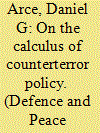| Srl | Item |
| 1 |
ID:
077071


|
|
|
|
|
| Publication |
2007.
|
| Summary/Abstract |
Scholars have devoted considerable attention to the informational role of international institutions. However, several questions about the informational aspects of institutional behavior remain underexplored: What determines how audiences respond to institutional decisions? Through what channels does information provision affect foreign policy? To answer these questions, I develop a formal model motivated by recent literature on the informational effects of security institutions. The formal model depicts information transmission between a domestic audience, an international institution, and a foreign policy maker. Statements issued by member states through the institution serve to inform the audience about the likely outcomes of its leader's actions. The model demonstrates that leaders have incentives to consult relatively conservative institutions, because their support convinces audiences that they should also support proposed policies. Leaders face incentives to avoid the disapproval of more revisionist institutions, because their opposition will tend to induce public opposition. The empirical implications are discussed
|
|
|
|
|
|
|
|
|
|
|
|
|
|
|
|
| 2 |
ID:
172141


|
|
|
|
|
| Summary/Abstract |
In democratic societies, elections can act as a referendum on politicians’ counterterror policy. At the same time, counterterror policy is conducted under conditions of asymmetric information because the government is better informed about the nature of the threat than is the public. Using a hybrid signaling model, this paper characterizes counterterror policy in terms of its instrumental efficacy against terrorists, and also non-instrumental considerations such as the electoral consequences of policy failures. In addition, the equilibria capture the difficulties that voters have in assessing the appropriateness of policy in the absence of terrorism.
|
|
|
|
|
|
|
|
|
|
|
|
|
|
|
|